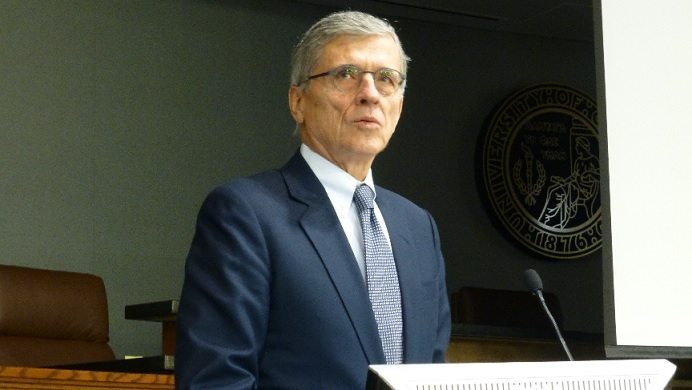BOULDER, Colo. – With 100 days of leadership now under his belt, Federal Communications Commission Chairman Tom Wheeler took to the stage in a closing keynote at a small conference to lay out his plans for guiding the government agency.
Speaking at this week’s University of Colorado’s Silicon Flatirons Center for Law, Technology and Entrepreneurship event focused on digital broadband migration, Wheeler emphasized that he remained committed to open Internet access, noting that a recent court decision favoring Verizon Communications in a fight with the FCC over net neutrality did not prevent the government agency from crafting rules to regulate access.
“The court opinion specifically included that the commission was justified in concluding that an open Internet would further the interest of broadband deployment by enabling the virtuous cycle of innovation that unites the long-term interests of end-users, broadband networks and edge-providers,” Wheeler said at the event. “After all, it explained, when edge-providers are prevented from reaching end-users, demand for both those upstream applications and for network expansion suffer. So, the preservation of an open Internet is within the FCC’s authority.”
In laying out his regulation principals, Wheeler cited a “seesaw” approach, noting that if industry does not heed the need to ensure the public good is accounted for, the FCC would not hesitate to act. Wheeler noted that this was evident in one of his first acts as chairman when he took wireless carriers to task for device unlocking. One month after those comments, wireless carrier trade association CTIA, which Wheeler used to head, and five wireless carriers had agreed to adopt a voluntary set of policies regarding unlocking mobile devices. The five carriers include Verizon Wireless, AT&T Mobility, Sprint, T-Mobile US and U.S. Cellular.
As for longer-range goals, Wheeler cited the need for government regulators to remain flexible in attempting to regulate the telecommunications industry, noting that the rapid pace of change in technology makes any new piece of legislation out-dated the minute it’s signed. Wheeler noted that this fact made any plans to re-draw the 1996 Telecommunications Act a tricky proposition that could take years to product and that such a task needed to be handled with as much forward-thinking as possible.
“The only way to deal with this reality is to have an expert agency capable of being as nimble as the innovators redefining technology and re-drawing the marketplace,” Wheeler explained. “We will behave that way today, and any new act must preserve that nimbleness going forward.”
An example of the changing nature of telecom was the planned 600 MHz incentive auction that will see the FCC work with television stations to free up spectrum assets to serve the growing demand for wireless broadband services. Wheeler explained how the planned auction, along with other initiatives including the IP transition, will feed the ability for the FCC to better serve the public need.
“Bigger picture, the FCC has the authority it needs to provide what the public needs – open, competitive, safe, and accessible broadband networks. Indeed, that we have authority is well-settled,” Wheeler said. “What remains open is not jurisdiction, but rather the best path to securing the public interest. Those are the challenges that the FCC will confront with the open Internet, the IP transitions, the incentive auction and other issues.”
Bored? Why not follow me on Twitter?

